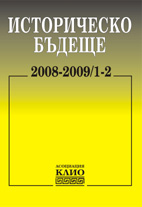Робската институция в България в периода на нейния залез
The Institution of Slavery in Bulgaria in the Period of Decline
Author(s): Olga TodorovaSubject(s): History
Published by: Асоциация Клио
Keywords: Ottoman Empire; Tanzimat; domestic slavery; military slavery; April Uprising; Russo-Turkish War
Summary/Abstract: Discussing the institution of slavery as an element of the public landscape of Bulgaria before the Liberation, the author tries to answer the question in what way with the passage of time the term slavery managed to became established on Bulgarian soil as a collective designation of the entire age of Ottoman rule of the Bulgarians. The article upholds the thesis that for the majority of Bulgarian subjects of the Ottoman Empire the institution of slavery and its two varieties (domestic slavery and elite/military slavery) stopped being a grave danger far before the beginning of the Tanzimat. On principle, even from the times of Ottoman establishment on the Balkans, Bulgarians were guaranteed the status of personally free ahl al-zimma, which was why they rarely and only by exception fell into the ranks of domestic slaves. Later, along with the final revocation of janissary “recruitment” somewhere at the end of the 17th – the first half of the 18th century, Bulgarians also stopped being used as military slaves. Then again, during the Tanzimat itself, when slavery in the entire Ottoman Empire began to decline thanks to a number of restrictive measures against slave trade undertaken by the Sublime Porte under British pressure, Bulgarians slipped completely out of the grasp of the institution of slavery. It was precisely the fact that Bulgarians regarded slavery as a fate awaiting “others” (Circassians and black Africans) that explains why the theme of slavery was relatively scarcely discussed in the legal Bulgarian press before the Liberation, as well as why in the Bulgarian immigrant press of the period the issue of slavery was brutally abused as a tool tailored to the objectives of the struggle for liberation, without succeeding in becoming a full-fledged part of the national modernistic discourse. The study also points out that, in the 19th century, in parallel with the crystallization of the national idea, the metaphorical usage of the term slavery made wide inroads in the Bulgarian public and political lexis as an expression of the dependence of the emerging nation on its ethnically and/or religiously alien authorities - the Ottoman secular power and the religious authority of the Greek Ecumenical Patriarchate in Constantinople. According to the author, the blending of the “two slaveries” — the real and the metaphorical one — in Bulgarian public opinion was mostly the result of the dramatic events of the years directly before the Bulgarian Liberation. During the April Uprising of 1876 and the Russo-Turkish War of 1877–1878 a certain number of Bulgarian women and children were kidnapped into slavery by participants in the irregular Ottoman military formations. Although not particularly numerous and effected against the will of the authorities, it was precisely these brutal enslaving which, it seems, categorically formed the notion of Bulgarians about the entire past period of alien spiritual rule as that of “slavery”.
Journal: Историческо бъдеще
- Issue Year: 2008
- Issue No: 1-2
- Page Range: 85-141
- Page Count: 57
- Language: Bulgarian
- Content File-PDF

